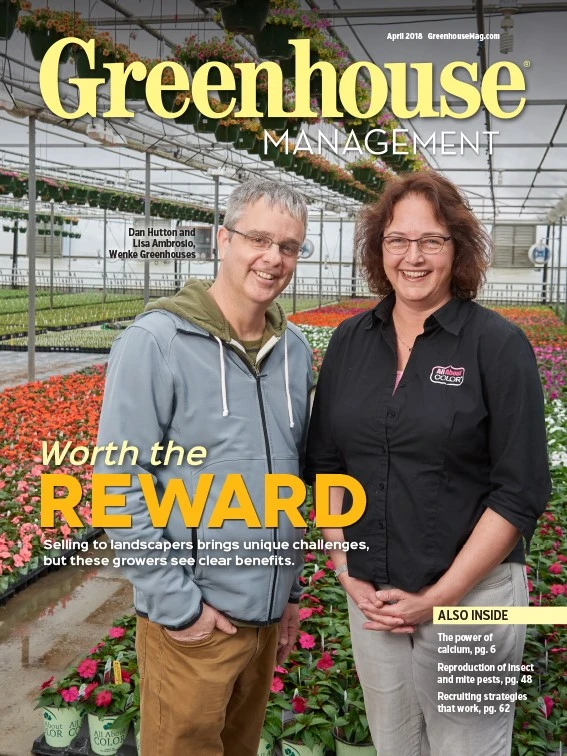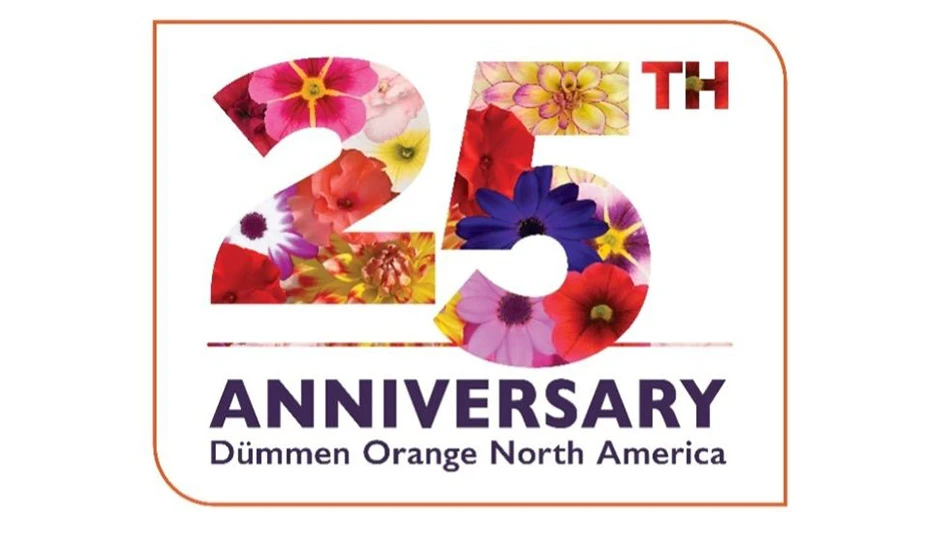
By keeping open, internet-connected lines of communication with landscapers and being responsive to their needs, Kalamazoo, Michigan-based grower Wenke Greenhouses succeeds in selling to this specific market.
Between its four locations, Wenke has 40 acres of undercover production space. Roughly two-thirds of the grower’s business goes to retail, either sent to independent garden centers — including its own Wenke Garden Center — or the brokerage Kalamazoo Flower Group, and the other third goes to landscapers, says owner Lisa Ambrosio.
Ambrosio and area sales manager Dan Hutton agree: Selling to landscapers is tough but rewarding.
“If somebody was looking at this from the outside, it seems so easy to do, but it’s not,” Ambrosio says. “There are a lot of challenges in having a specific order for a specific customer ready at a specific time.”
However, landscapers add to Wenke Greenhouses’ customer base and provide the grower with a consistency in sales volume, Hutton says.

Customer service
No matter the customer, Wenke excels in communication and incorporating technology into its processes, Hutton says. “We try to have as much real-time information as possible on our website for accessing availability, placing orders, monitoring your orders and shipping your orders, getting them organized for when you would like to have them come in,” he says. “We’re not emailing back and forth — Lord knows we don’t fax anymore.”
Wenke organizes its orders to improve efficiencies for landscapers by sorting products on racks by “job” instead of by plant material, Hutton says. The business prioritizes having accurate inventory, Ambrosio says. For example, if a customer places an order in December, the business can have the product ready for them when they expect it in May.
The grower needs to watch its pre-books closely for both retailers and landscapers, but the business pre-books more orders for landscapers than for retailers, Hutton says. “We do our forecasting almost a year in advance, and then we generate the availabilities based on the timeframes that the pre-books will be placed,” he says. “Then we publish them to websites where the landscapers can go and download them and begin to place their orders that they’ll be pre-booking.”
Wenke closely monitors incoming orders with its current production plans and adjusts production accordingly, Ambrosio says. “We’re monitoring it to see if we need to go up or down on any particular item based on how the orders are coming in,” she says.

There are inevitably times when landscapers place late orders with Wenke that will need to come from the grower’s speculative production, and the grower doesn’t have the exact item they are looking for, Ambrosio says. In such cases, the grower first looks for availability of the same variety and color in other sizes, Hutton says. If it isn’t available in a different size, then Wenke might suggest replacing it with a slightly different color. If a landscaper orders a SuperCal Neon Rose, for example, Hutton might suggest replacing it with SuperCal Violet or SuperCal Cherry.
“We just don’t make that change,” Hutton says. “We perhaps put it on the order to lock it in for the landscaper, and then we send them a notification — perhaps a copy of the order in its entirety — so they can see how it fits in with the alternate variety or size that we’re proposing.”
Hutton and his colleagues aim to ship Wenke’s own product first, but they can also fulfill landscapers’ orders as specified by contacting other area growers for plant material.

Perfecting the product
Packaging is the main difference between the plants Wenke sells to retailers and those it sells to landscapers, Hutton says. The crops it sells to landscapers have biodegradable wrappers encasing their roots, rather than shelf-ready packaging and universal product codes (UPCs). Another difference is that summer plants in full bloom appeal to retailers. Many landscapers may prefer their plants in “max color” as well, but Hutton says those plants are in some cases needier than budded and cracking-color plants, which other landscapers may find to be healthier and readier for installation.
Plant growth regulator (PGR) needs may also vary between the different customers, Hutton says. “Some retailers may aspire for a petite, cute plant with good shelf life,” he says. “This may require the use of growth regulators in a manner that is not conducive with how we want plants to perform for landscapers. Therefore, [for] items grown in landscape flats as well as other configurations [for which] we realize landscaper demand is the greatest, we either reduce significantly what the label may call for and/or shy away from the use of PGRs altogether.”
The greenhouse works with local landscapers and attends forums where Wenke’s growers and landscaper clients discuss reducing and eliminating PGR use, Hutton says. In addition, Hutton tells growers that plants must be vigorous when installed. “And then I trust that they’re using their knowledge base and research that they’ve seen and picked up over time in the greenhouse, as they treat the plants appropriately,” he says.
Varieties that Ambrosio and Hutton say are popular with Wenke Greenhouses’ landscaper customers include: SunPatiens, Whopper and Megawatt begonias, SuperCals, Supertunias, Wave petunias, lantanas, zinnias and Victoria Blue salvias. “For our landscapers, we certainly pick varieties that are good garden performers … they’re going to be actively growing when they receive them and will perform well for them,” Ambrosio says.
Why sell to landscapers?
The number of Wenke’s landscaper customers is increasing, Hutton says. One advantage of having landscaper clients is that their volumes will not fluctuate much with the weather because they have contracts with their customers.
Selling to landscapers is also beneficial, Hutton says, because it expands the greenhouse’s customer base of independent garden centers, hardware stores, re-wholesalers and the Kalamazoo Flower Group. Plus, selling to landscapers is innately satisfying, Hutton says. “It’s rewarding to see plants that you’ve produced [on the Magnificent Mile in Chicago], at Mackinac Island at the Mission Point Hotel, or down Michigan Avenue,” he says. “There’s that intrinsic … pride that you can’t really place a dollar figure on when you do work with the landscapers, as well.”
Get curated news on YOUR industry.
Enter your email to receive our newsletters.
Explore the April 2018 Issue
Check out more from this issue and find your next story to read.
Latest from Greenhouse Management
- Flexible fungicides
- Super Charged Moon Juice from Moon Valley Nurseries now available nationally
- 2025 Proven Winners Horticulture Scholarship applications now open
- How to improve inventory and shipping management in the greenhouse
- Leading Women of Horticulture: Anna Ball, Ball Hort, and Terri McEnaney, Bailey Nurseries
- GM CEA HERB Part 2: A guide to increasing the sowing density of culinary herbs
- GM CEA HERB Part 1: Best practices for producing culinary herbs in controlled environments
- USDA fires experts on invasive pests, including Asian citrus psyllid, chilli thrips






